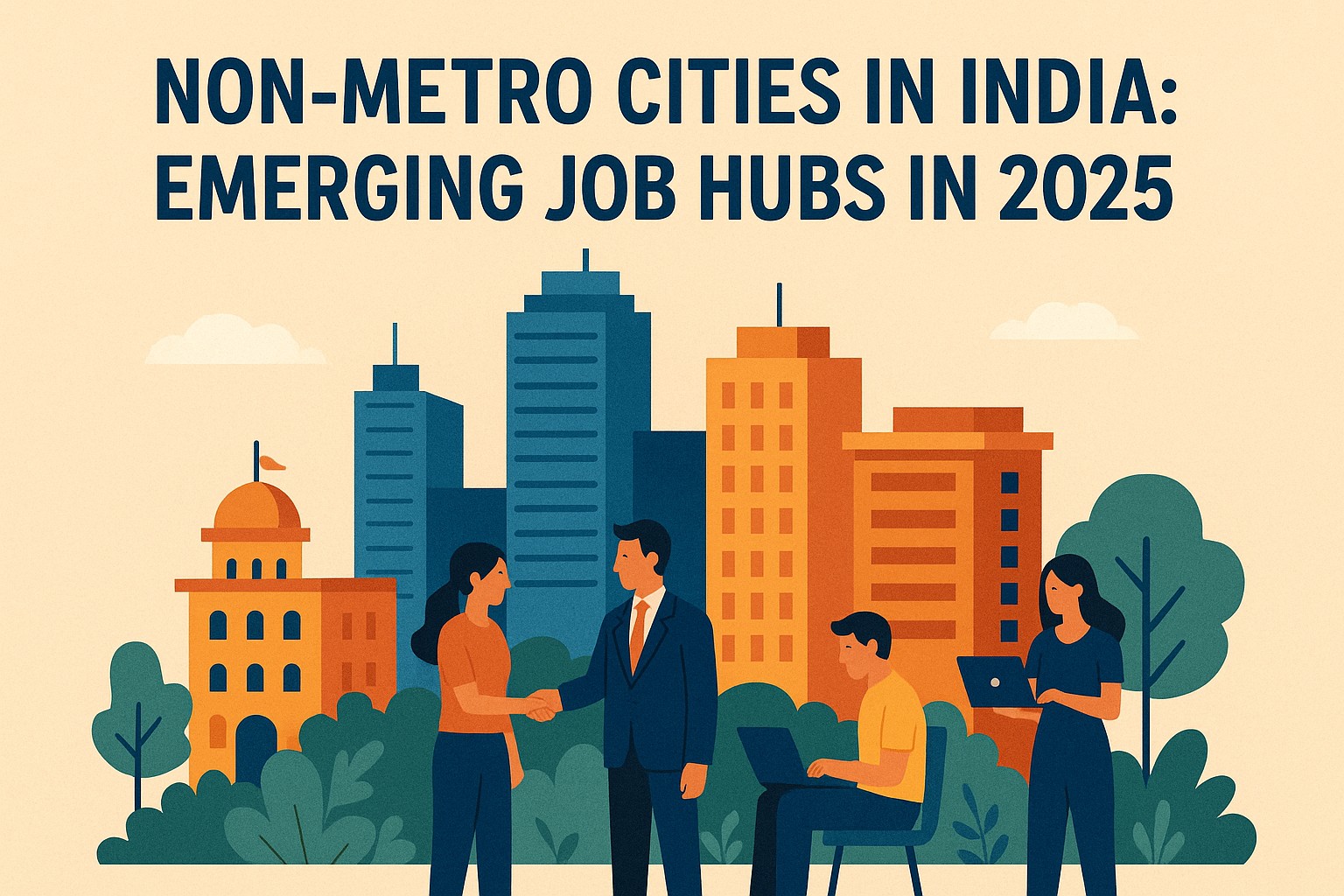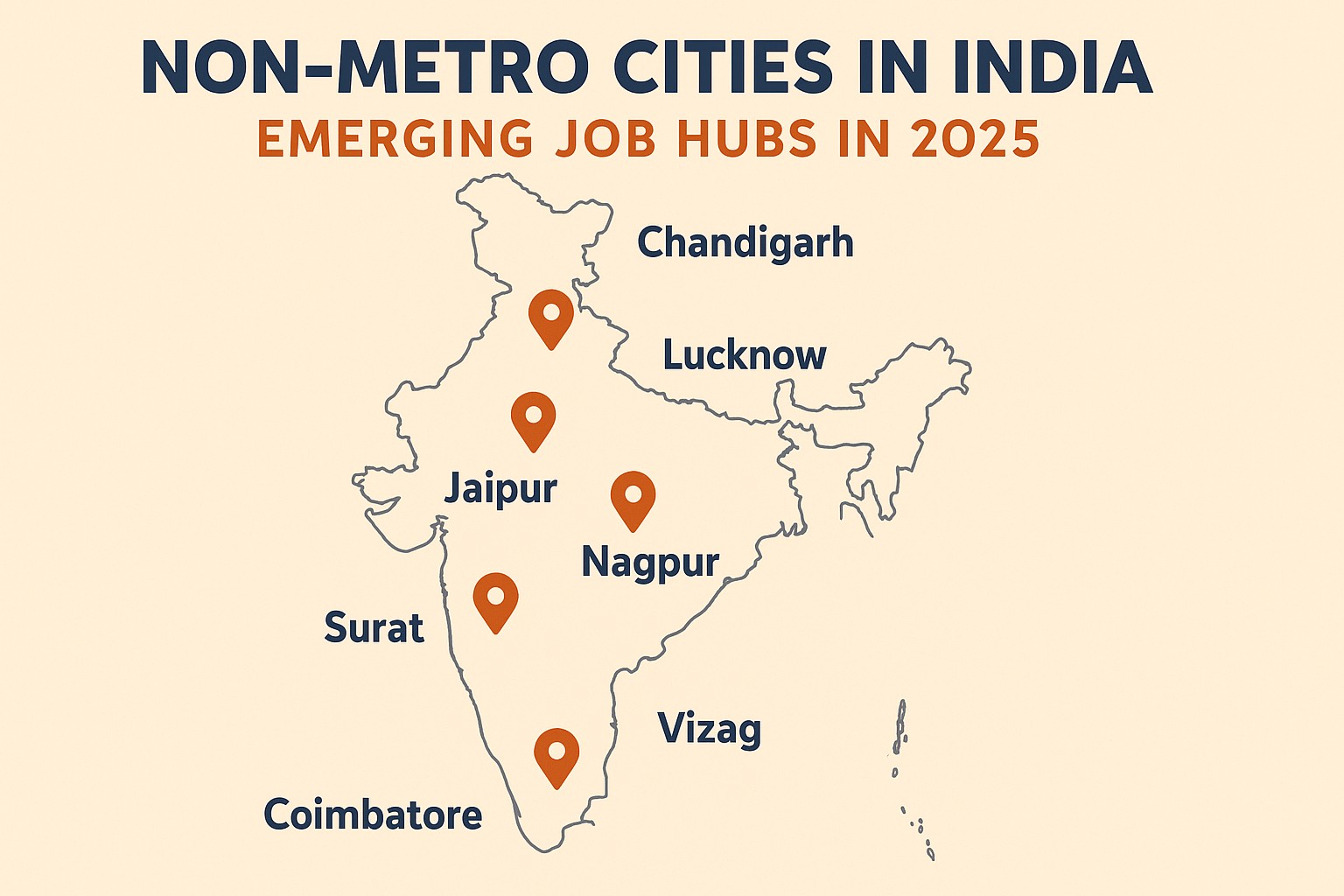Non-Metro Cities in India are rapidly becoming the new hot spots for jobs and talent. As the economy continues to grow and evolve, more professionals are seeking opportunities beyond traditional metropolitan areas. Non-metro cities are increasingly offering a wealth of opportunities in various sectors, from technology to manufacturing, education, and more. This emerging trend marks a shift from the traditional focus on major metropolitan cities like Mumbai, Delhi, and Bangalore.
The rise of these smaller cities as job hubs is no accident. Several factors, including improved infrastructure, government incentives, and a growing preference for a better work-life balance, have contributed to this shift. In this article, we explore how Non-Metro Cities in India are shaping the future of employment and attracting professionals from across the country.
Key Non-Metro Cities in India for Job Opportunities in 2025
-
Visakhapatnam: Tech and Pharma Hub
Visakhapatnam, a coastal city in Andhra Pradesh, has rapidly transformed into a key industrial and technological hub. Its growing infrastructure, including ports and an emerging IT ecosystem, has attracted numerous multinational companies in the tech and pharmaceutical industries. This city offers lucrative job opportunities, especially in sectors like IT, data analysis, and pharmaceuticals (Source).
-
Ranchi: A Growing Center for Government Jobs and Education
Ranchi, the capital of Jharkhand, is another non-metro city gaining traction for job seekers. The city’s strong educational ecosystem and the growing public sector employment opportunities make it an attractive destination for professionals looking for stability. In addition to the government sector, industries like mining and steel manufacturing also offer a variety of job opportunities. The increasing development of infrastructure further adds to the city’s potential (Source).
-
Vijayawada: Combining Culture and Commerce
Vijayawada, located in Andhra Pradesh, is another city witnessing a significant rise in job opportunities. The city is known for its strong IT and educational sectors, with a growing number of startups and tech companies setting up operations here. The city’s metro project and expanding airport infrastructure have also made it easier for professionals to work and live here, making it an attractive alternative to metro cities (Source).
-
Nashik: From Vineyards to Manufacturing
Nashik in Maharashtra has traditionally been known for its vineyards and agriculture, but it’s now becoming a manufacturing and industrial hub. The city is seeing rapid growth in sectors like automobile manufacturing, defense, and IT services. With the rise of e-commerce and logistics industries, Nashik is diversifying its economy, making it an excellent place for job seekers (Source).
-
Raipur: A Model of Modern Urban Planning
Raipur in Chhattisgarh is becoming known for its focus on urban development and infrastructure. With the “Naya Raipur” initiative, the city has attracted investments in various sectors, including steel manufacturing, technology, and education. Raipur’s push for sustainability and a tech-driven economy is helping it emerge as a promising destination for professionals (Source).
-
Agra and Madurai: Heritage Meets Modern Growth
Agra and Madurai, famous for their historical and cultural significance, are now gaining attention as centers for modern economic activity. With industries such as tourism, textiles, and education flourishing, these cities are becoming appealing for people seeking a blend of tradition and modern growth. Agra is also becoming a hub for the manufacturing and export sectors, while Madurai is emerging as a prominent educational and commercial center (Source).
-
Vadodara and Jodhpur: Industrial Growth and Startups
Vadodara in Gujarat and Jodhpur in Rajasthan are other examples of non-metro cities that are rapidly growing. Vadodara has long been known for its chemical and petrochemical industries, but now, IT and manufacturing sectors are also booming here. Similarly, Jodhpur has seen a rise in the startup ecosystem, with many entrepreneurs setting up shop due to the low cost of living and growing infrastructure. These cities are perfect examples of how non-metro cities are changing the landscape of employment (Source).
Why Non-Metro Cities Are Gaining Popularity for Jobs
-
Improved Infrastructure:
The development of metro systems, airports, and highways has significantly improved the connectivity of non-metro cities. Cities like Visakhapatnam and Vijayawada are benefiting from enhanced transportation, making them more accessible to businesses and professionals alike. -
Cost of Living:
The cost of living in non-metro cities is considerably lower than in metropolitan areas. Professionals can enjoy a better quality of life, with affordable housing, transportation, and daily expenses, all while earning competitive salaries. -
Government Support:
Many state governments have introduced schemes and policies to attract businesses to non-metro cities. Initiatives such as tax breaks, infrastructure development, and incentives for businesses to establish themselves outside metropolitan areas have paved the way for job creation in these cities (Source). -
Remote Work:
The rise of remote working, accelerated by the pandemic, has also played a crucial role in this shift. Professionals in non-metro cities can now work for multinational companies based in metro cities without leaving their hometowns. This trend has opened up a wide range of opportunities for talent across the country.
The Future of Non-Metro Cities in India
The future of Non-Metro Cities in India looks bright. As more businesses look to diversify their operations and reduce costs, these cities will continue to grow as attractive employment hubs. With ongoing development and government initiatives, professionals are likely to flock to these cities for a wide range of career opportunities, creating a more balanced job market across the country.
As non-metro cities continue to grow, they will undoubtedly contribute to India’s economic expansion. From IT hubs to educational centers and manufacturing powerhouses, these cities are shaping the future of work in the country.


